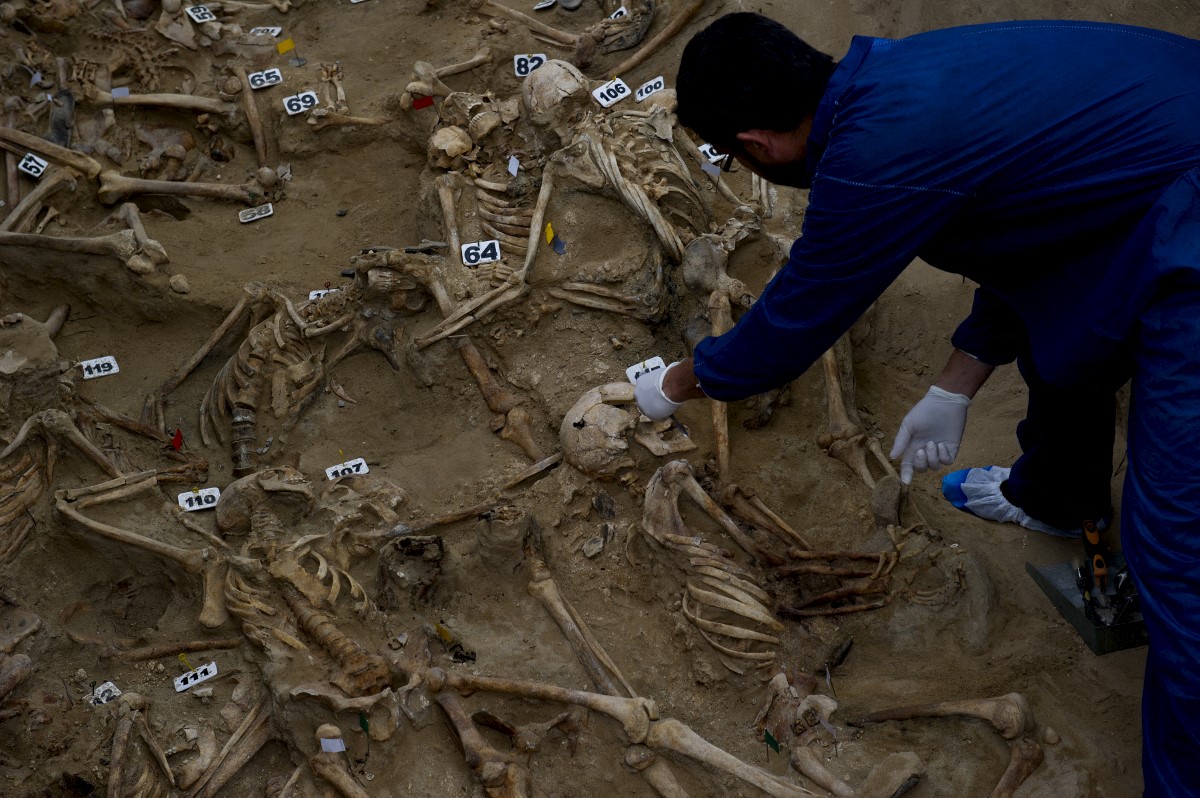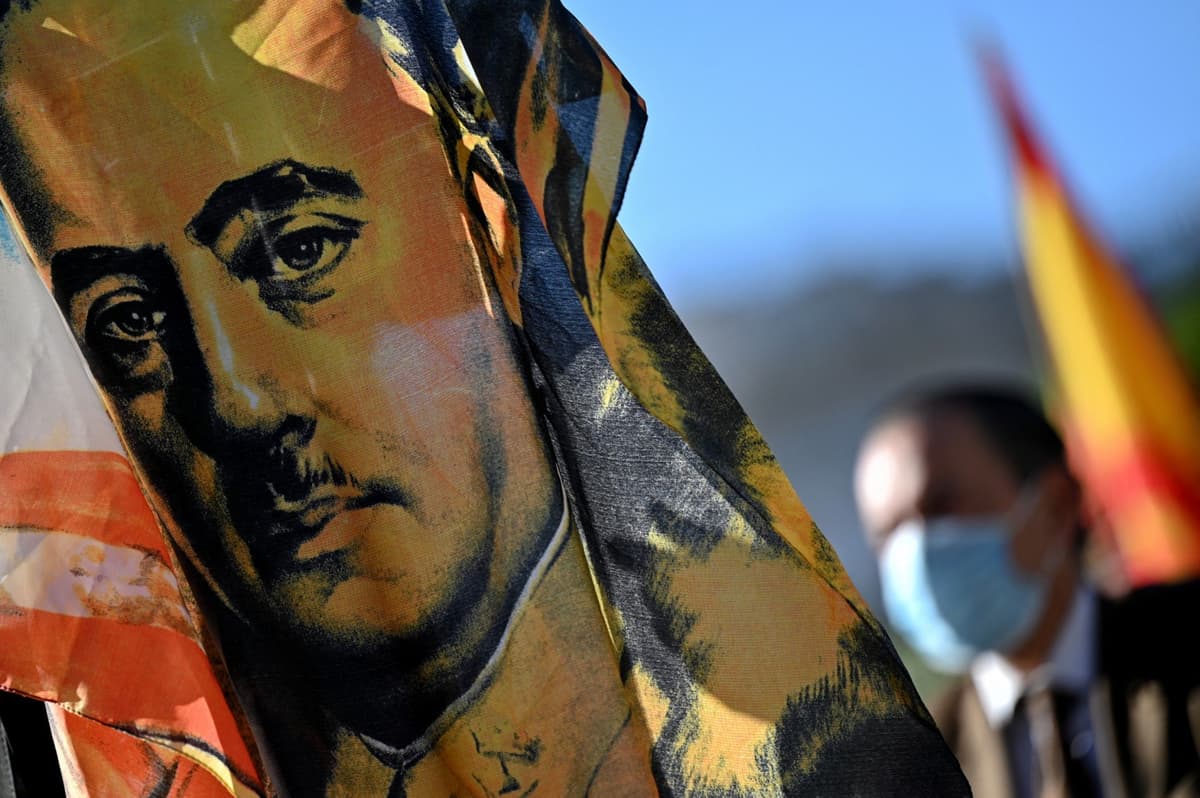Legislation proposed by regional right-wing governments in Spain to override a historical memory law has caused outrage as it omits the word 'dictatorship' entirely from the text.
Critics have called the Ley de Concordia (Harmony Law) which is being pushed by Partido Popular (PP) and far-right Vox coalition governments in the regions of Valencia and Castilla y León, an attempt to "whitewash" Spain's dictatorial past. In the northern region of Aragón, similar legislation was passed in February.
As a result, Spain's Ministry of Territorial Policy and Democratic Memory is considering taking a case to the Spanish Constitutional Court, claiming that the PP-Vox coalitions are attempting to unpick the government's Democratic Memory Law.
READ ALSO: Spain’s lawmakers pass bill honouring Franco-era victims
The wide-ranging Democratic Memory law, which was passed in October 2022, attempted to settle Spanish democracy’s debt to its past and deal with the complicated legacies of its Civil War and the dictatorship of Francisco Franco, which lasted from 1939 to 1975.
Among many measures, it declared Francoist courts illegal, therefore annulling convictions made by them or any affiliated criminal or administrative bodies since 1936, and took steps to create a DNA bank to help identify victims buried in unmarked graves.
But by attempting to overturn it, or at the very least limit its effects, right-wing coalitions around Spain have sparked furious debate about the legacy of the Spanish Civil War and the dictatorship that followed. Several regional authorities have suggested the Democratic Memory Law is historically biased and only recognises the victims on one side of the conflict.
Yet the Ley de Concordia does not use the word 'dictatorship' at all and fails to mention the 1936 military coup that sparked the Spanish Civil War, suggesting instead that “there has never been a consensus on … the Civil War and Francoism."
READ ALSO: 13 changes you may have missed about Spain’s new ‘Civil War’ law
Critics, notably the left-wing Socialist (PSOE) led government that passed the Democratic Memory Law, have fiercely criticised the move, not only for attempting to whitewash history but against the PP specifically, claiming it is increasingly beholden to the far-right politics of Vox. In this far-right narrative, it is common for some Franco sympathisers to equate the Second Republic, a short-lived period of Spanish democracy between 1931-1939, with the dictatorship.
This has angered many in Spain. "You can't compare: a dictatorship resulting from a military coup, the totalitarian imposition of a regime without freedom, with the democracy of the Second Republic, when those who decided who their representatives were the Spanish people," said Ángel Víctor Torres, the Minister for Territorial Policy and Democratic Memory, in a press conference addressing the dispute.
"What Vox is trying to do is to whitewash the dictatorship and this is unacceptable from the point of view of the Constitution. No democrat can be an accomplice to that," he added.

The Spanish right, on the other hand, argue the Democratic Memory Law presents "a biased and sectarian vision of history," according to Carlos Menéndez, Vox spokesman in Castilla y León. It is necessary to "eliminate ideological impositions that try to fix an official version" of history, he added.
In reality the Democratic Memory Law covers all victims, regardless of ideology and which side they were on in the Civil War. In practice, it is true the legislation is more likely to involve families of Republicans, the losing side in the war, because it is overwhelmingly their relatives who still lie in unmarked graves and ditches.
The Ley de Concordia is still yet to be approved in the regional legislatures in Valencia and Castilla y León, whereas the government in Aragón moved forward with its own legislation earlier in the year.
The conflict highlights the deep underlying divisions still present in Spanish society over its past. For many in Spain, the dictatorship is in living memory. In more lively political arguments in Spain, whether at an official level or on the street, rojo (red) and facha (fascist) are still fairly common insults.
On a political level, the row reveals just how influenced the centre-right PP has become by its far-right coalition partners. Following regional elections in Spain in May 2023, the PP entered into coalition agreements with Vox in several regions including Valencia, Aragón, Castilla y León and Murcia.
The dispute over democratic memory legislation has put PP leaders under political pressure. The President of the Valencian regional government, Carlos Mazón, has reiterated that Francoism was "of course" a dictatorship. Alfonso Fernández Mañueco, President of the Junta de Castilla y León has made similar statements, confirming that "Francoism was a dictatorship."
However, in both regions the PP is in coalition with Vox, an openly far-right party whose leader Santiago Abascal has claimed Prime Minister Pedro Sánchez is the worst leader in Spanish history, implying that the democratically elected Socialist government is worse than the Franco dictatorship.
During the scandal, Vox MEP Herman Tertsch posted a celebratory social media message on March 28th, the anniversary of the day Nationalists entered Madrid and essentially ended the Spanish Civil War, claiming that Madrid had been "liberated by Franco from 32 months of red terror."
READ ALSO: Why do many people see Spain's flag as a fascist symbol?

Join the conversation in our comments section below. Share your own views and experience and if you have a question or suggestion for our journalists then email us at [email protected].
Please keep comments civil, constructive and on topic – and make sure to read our terms of use before getting involved.
Please log in here to leave a comment.